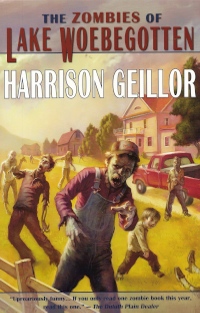“It’s been a quiet week in Lake Wobegon, Minnesota, my hometown out on the edge of the prairie.” This is Garrison Keillor’s introduction each Sunday morning on his NPR broadcast, which is the podcast I listen to on my iPod each Monday as I pedal my bike to my favorite Starbucks for a summer frappuccino or a winter mocha. So far Keillor has made no mention of zombies, though the Norwegian bachelor farmers who inhabit the outskirts of the village may shamble about some after a visit to the Sidetrack Tap for a bump and a beer.
I have to admit to being a Lake Wobegon addict. I can’t get enough of Keillor’s down-home deadpan humor, even going so far as to purchase collections of past monologues. That’s the reason I couldn’t wait to get my hands on this month’s parody of the undead, The Zombies of Lake Woebegotton by Harrison Geillor (from Night Shade Books, out on September 14th). The book should be particularly appealing to select groups of readers: Keillor addicts like me and anyone who has ever lived in Minnesota (or possibly North Dakota or Wisconsin or Northern Iowa) or has ever visited those cold northern states or has ever known the more enlightened folks who emigrated south and west. Fans of zombie novels with no such backgrounds will definitely miss a lot of the fun.
Late one night, when old Gunter Montcrief wanders from his fish shack on the shore of the lake to empty his bladder, he spies “a streaking meteor that was either the size of a house and up very close or the size of a Midwestern state and very far away, and Gunter felt a dark thrill of satisfaction that the world wouldn’t survive him after all, that it didn’t much matter if he was the last of the Montcriefs, since this was the dinosaur-killer-sized space rock Hollywood had been trying to scare people with for the last bunch of years. Gunter wondered if it would be earthquakes or tsunamis or volcanoes and then wondered if the people of Lake Woebegotten deep in central Minnesota away from the dangerous coastlines, would even notice the end of the world apart from the ones who’d lose their satellite TV reception and their ability to order shoes off the internet [sic].
“But then the meteor exploded silently into dust, pretty much tiny cinders no bigger than fireflies drifting down…”
Anyone who has ever read John Wyndham’s The Day of the Triffids knows that, although an unexpected meteor shower can be pretty spectacular, nothing good is going to happen the following morning. The question is: What is worse, a world of blind folks and triffids, or the dead coming back to life with a ravaging hunger for human flesh?
The first third of the novel, “Day One: Not too Good a Day, Really Over All,” introduces the setting and the cast of characters, most of them satirical copies of the regulars from Keillor’s Sunday broadcasts. There are some not-so-subtle differences. The retired school superintendent has, since his teenage years, been a serial killer, with dozens of victims buried in his basement and stored in his attic; the wife of the local car dealer is having an affair with the proprietor of Dolf’s Half-Good Grocery and plans to dispose of her husband permanently; Lutheran Pastor Daniel Inkfist and Catholic Father Edsel are forced to put aside their differences and join forces against the zombie menace; and so it goes.
For fans of the original Lake Wobegon broadcasts, the highlight is the middle third of the book, “Twenty-Some-Odd Scenes from the Winter in No Particular Order, Certainly Not Chronological.” These tongue-in-cheek (not always the characters’ own tongues) chapters read very much like listening to Keillor discussing the comings and goings in his hometown. The big difference is, of course, the zombies. The vignettes ramble about, not always making a lot of sense, until they are all brought together at the end.
In the final section, “The First Day of Spring, More of Less: Nice Weather, Shame About the Zombies Though,” Lake Woebegotten has its own version of the Zombie Apocalypse, complete with earthshaking explosions, raining bits of flesh (zombie and otherwise), a zombie black bear with a battle axe imbedded in his skull and potluck dinners provided by the Lutheran ladies auxiliary.
It is much easier to create a parody of something that is taken seriously than to parody humor or to parody what is actually a parody in the first place. And it is difficult to sustain a satire based on 15-minute comedy bits at novel length. These are the problems with The Zombies of Lake Woebegotten. Nevertheless, there are enough laugh-out-loud moments and nostalgic references to make the book pretty much fun, more or less, overall.
Mark Graham reviewed books for the Rocky Mountain News from 1977 until the paper closed its doors in February 2009. His “Unreal Worlds” column on science fiction and fantasy appeared regularly for over two decades. He has reviewed well over 1,000 genre books. If you see a Rocky Mountain News blurb on a book, it is likely from a review or interview he wrote. Graham also created and taught Unreal Literature, a high school science fiction class, for nearly 30 years in the Jefferson County Colorado public schools.










